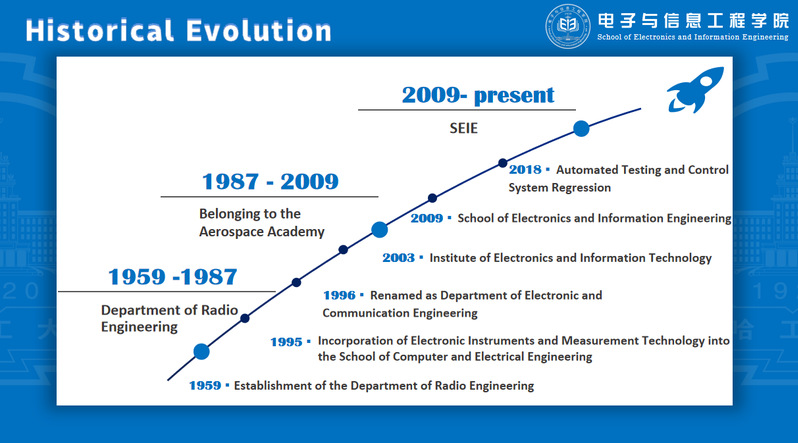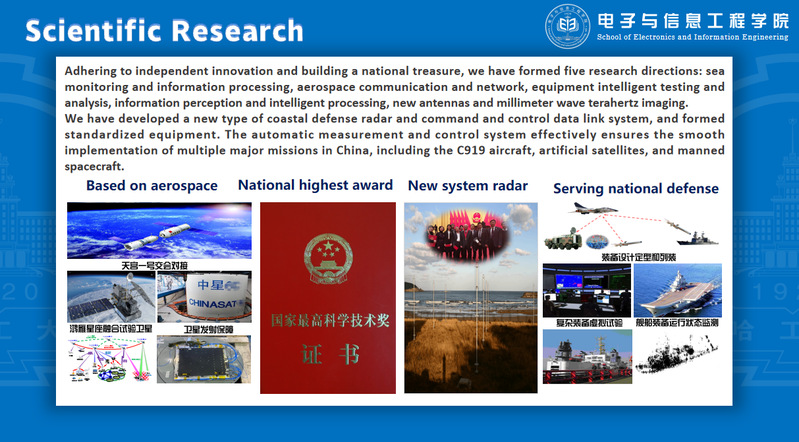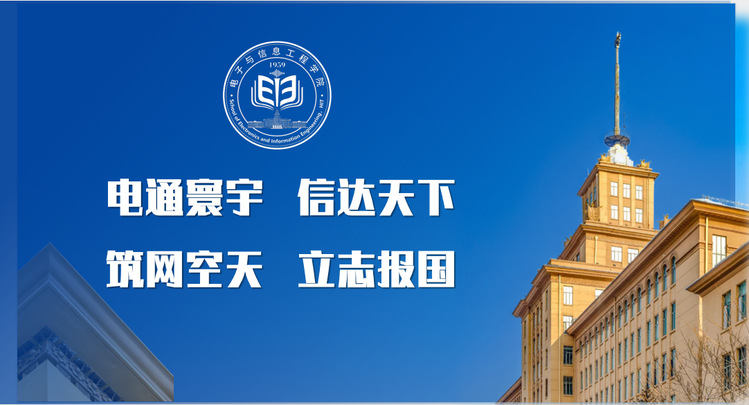The predecessor of the school was the Department of Radio Engineering at Harbin Institute of Technology, founded in 1959. In 1996, it was renamed the Department of Electronic and Communication Engineering. In 2003, the Institute of Electronic and Information Technology was established, and in 2009, it was renamed the School of Electronics and Information Engineering. The school has a first level discipline of Information and Communication Engineering and a second level discipline of Electromagnetic and Microwave Technology. In 1981, the discipline of Information and Communication Engineering was identified as one of the first master's programs, and in 1998, it was designated as a national first level discipline doctoral program. In 2007, the second level discipline of Communication and Information Engineering was rated as a national key discipline, and the second level discipline of Signal and Information Processing was rated as a national key cultivation discipline. In 2012, the first level discipline evaluation of the Ministry of Education ranked 10th in the country, The result of the fourth round of subject evaluation by the Ministry of Education in 2016 was A -. At present, the school has six majors: Communication Engineering, Electronic Information Engineering, Information Countermeasures Technology, Remote Sensing Science and Technology, Electromagnetic Field and Wireless Technology, and Intelligent Measurement and Control Engineering. Among them, Communication Engineering and Electronic Information Engineering are key majors for national defense and key majors in Heilongjiang Province, while Information Countermeasures Technology and Remote Sensing Science and Technology are scarce majors for national defense. The school currently has 1127 undergraduate students, 331 master's students, and 237 doctoral students.

Since 1959, the school has cultivated a large number of outstanding talents, who play an important role in different jobs. Typical representatives of them include Ben De, academician of the CAE Member, Li Huidi, vice president of China Mobile, Zhao Xianming, president of ZTE, Ren Yong, professor of Tsinghua University, Liu Erqi, president of the Third Academy of Aerospace, Wang Gang, chief scientist of Alibaba Artificial Intelligence Laboratory, etc. Generation after generation of graduates adhere to the school motto of strict standards, diligent work, silently cultivating and selflessly contributing to the economic development and national defense and aerospace industry of our country in various industries.
The school has formed a group of disciplinary directions with distinct national defense and aerospace characteristics, combining international academic frontiers and major national strategic needs. In the past five years, we have undertaken a total of 493 scientific research projects, with a total research funding of 421 million yuan. We have published over 400 SCI papers, authorized over 400 patents, and won one first prize of the National Science and Technology Progress Award and 15 provincial and ministerial level Science and Technology Progress Awards. Developed China's first high-frequency ground wave over-the-horizon radar, designed and implemented a dedicated data link system for precise target tracking, solved multiple key technologies in national defense and aerospace equipment, improved the technical level and capability of China's defense equipment, and broke international monopolies; We have established a dedicated communication system brand with independent intellectual property rights to safeguard the country's economic construction and development.

The school has always adhered to the fundamental task of cultivating morality and talents, the central position of talent cultivation, and the basic position of undergraduate teaching. Adhering to the eight major education and teaching reform measures proposed by the school, which are transforming concepts, strengthening general education, refining courses, emphasizing practice, emphasizing the two modernizations (personalization and internationalization), building organizations, strict evaluation, and promoting development, we strive to build a high-level undergraduate education system and continuously improve the quality of undergraduate talent cultivation. In the past three years, a total of 1 national high-quality online open course (Antenna Principles) has been selected, and 22 textbooks and monographs have been published. With the support of national defense characteristic disciplines and professional construction, one national engineering practice education center and one provincial-level experimental teaching demonstration center have been established.
